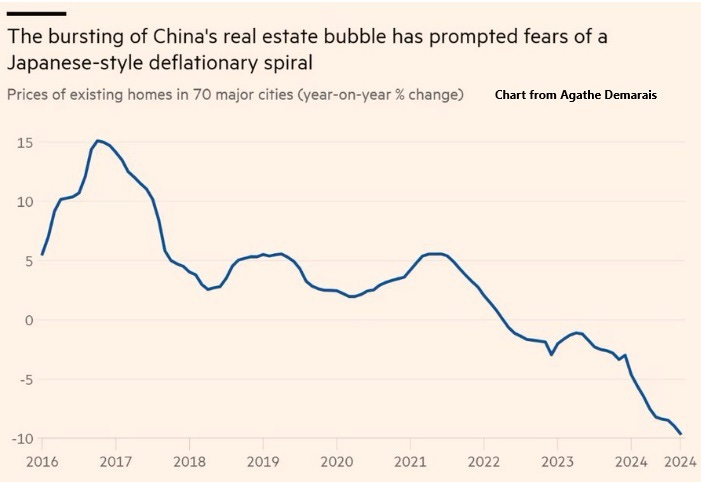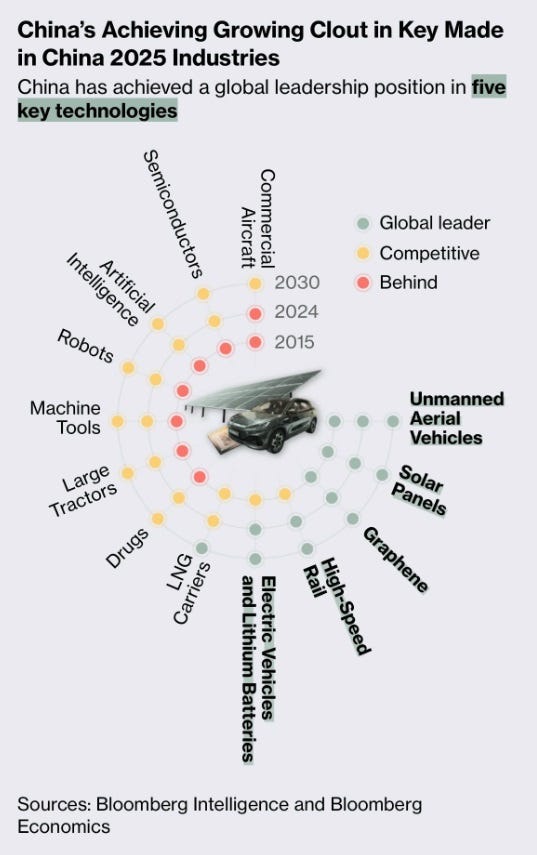One of the points we made in our book, Challenging China, is that too many people claimed the Communist Party of China was somehow more farseeing than other countries’ governments. They play the long game, was the argument, thinking far further ahead than the rest of us. This we asserted is nonsense, presenting lots of evidence for our argument, including citing many of the short-sighted economic decisions made by China’s leaders. In fact, since my book was published, we’ve seen many of the consequences of those decisions as the economy has slowed and many challenges, once hiding in the tall grass of economic growth, are now laid bare for all to see in an era of mowed down GDP.
But China’s multitude of challenges has now given rise to a new simplified thinking, the converse of the idea that China’s leadership is all-knowing and strategic: that Xi Jinping is incompetent, making one foolish decision after another.
Substacker Noah Smith is perhaps the chief and most famous proponent of this theory. Back in 2021 he wrote a Substack article, “What if Xi Jinping just isn't that competent?” And since then he’s tweeted many tweets around that theme. Smith argues that Xi has made things worse for China’s economy and in its foreign relations. We’ve seen many other analysts making these arguments too.
But, like the idea China is somehow wiser and more strategic, the idea that Xi Jinping is incompetent is also too simplified an analysis. It misses both the global sandbox Xi plays in and the goals he wants to accomplish.
On the economy, Smith notes that Xi waited seven years into his rule to do anything about the economy’s overreliance on real estate. He also points out Xi is propping up state owned enterprises (SOEs) at the expense of the private sector, has cracked down on different industry sectors and hasn’t proven he can build up China’s semiconductor sector. Smith says, “Overall, Xi’s approach to the economy looks an awful lot like a kid playing with toys — smashing the ones he doesn’t like, telling his favored champions to go forth and conquer.”
These are good criticisms of Xi’s approach to the economy. And I’m not here to say Xi is ultra competent. But it’s also more complicated than stating Xi is incompetent. On real estate, it is true that Xi waited a long time to pop the bubble, but popping a bubble is a precarious action to take and one that his predecessor was unwilling to do. But Xi did eventually take the necessary step of popping the real estate bubble. And despite enormous pressure to backtrack, Xi has resisted re-inflating the bubble, even as China’s economy has slowed. It was politically difficult to pop the bubble and required China entering uncharted economic territory to do so. So, sure, Xi might have been too slow, but he does deserve credit for taking a politically risky and economically difficult step to deal with the real estate sector and to continue down a long difficult path rather than backtracking when the economy slowed down.
I‘m not going to defend Xi’s emphasis on SOEs. Likely propping up state owned companies at the expense of the private sector will eventually retard China’s economy even more. But Xi’s vision is for a Chinese economy more focused on making things rather than producing e-commerce companies. And China has been fairly successful at that, at least in the short term. Investment has moved from software companies to industry sectors that are focused on making physical things. Everything from EVs to machine tools, from robotics to solar panels. Xi’s goal is for China to be preeminent in what he deems strategic industries. And to eliminate vulnerabilities in these industries and in their supply chains. Xi’s goal is for China to be resilient and self sufficient.
China has been fairly successful in building up what it deems strategic industries. You can see that in the chart below from Bloomberg’s Joe Weisenthal. The Made in China 2025 policy begun in 2015 under Xi Jinping determined 10 industries it wanted China to be competitive in by 2025, including IT, robotics, green energy and aerospace. China has become competitive in all of these industries except for airplanes. That does not sound like incompetence to me.
Of course, whether China will continue to be successful in developing strategic industries, given other policies Xi has instituted in recent years, and how helpful being successful in these industries is to the welfare of your average Chinese is another question. So far Xi has been successful in pushing investment from the ecommerce area into these strategic industries. But will those industries continue to be productive with China’s new emphasis on SOEs? What will be the effect on companies in those industries from China’s crackdown on other industries? Yes, the strategic industries are now receiving more investment but what is the psychological impact on CEOs and workers that an industry can be closed down nearly overnight as happened with tutoring and parts of the tech sector? Will this investment lead to productive results?
Of course, building up these strategic industries has not done much for your average Chinese. Unemployment is still high among young people. Consumer spending is not growing very much. Finding returns on investment within China is difficult. Strong strategic industries, higher exports and lower imports might be great for China’s ability to invade Taiwan, change the global order and project power but none of that makes life better for the Chinese people.
In addition, China’s efforts to become self-resilient is likely to make both China and the global economy less efficient. But it fits into Xi’s other goals, including giving China the flexibility to flex its muscles around the world and perhaps blockade or invade Taiwan with less vulnerability to sanctions by the United States and other countries. So, it’s not that Xi is being incompetent as that his goals are different than operating the economy in the most efficient and equitable manner.
And speaking of flexing muscles around the world, folks pointing to Xi’s incompetence, including Smith, often point to China’s wolf-warrior diplomacy throughout the Xi years. China, they point out, has annoyed, offended and caused deep concern in countries around the globe with its more forceful policies, harsh statements and military maneuvers. And sure, if China wanted to get along with countries better it is incompetent to alarm and annoy countries the way it has. But again, what is Xi’s goal? He wants to make China great again, to make it a global power and to make the world safe for authoritarianism. And, of course, to take control of Taiwan.
This means in the extended neighborhood of China, for example in the South China Sea, China has regularly violated exclusive economic zones of Vietnam, the Philippines, Indonesia and other countries. It has shot water cannons at Filipino ships. It has used all sorts of forceful language claiming territory nearly 1000 miles from its shores. That is not incompetence, it is a specific strategy to get what it wants. Sure that has helped create alliances among countries to counter this aggression. And countries like Japan and Vietnam are forging closer relations because of China’s measures. But that’s the price of playing this South China Sea game. It’s not incompetence, it’s a necessary trade off. China could get along better with its neighbors but that is not its goal. It’s goal of controlling the South China Sea, including by claiming territory nearly 1000 miles from its shores, necessitates strained relations.
It is not incompetence that Xi has ditched Deng Xiaoping’s “keep a low profile and bide your time” strategy. It was a conscious choice that China was now strong enough, and the U.S. and other countries weakened enough, to allow China to break out and exert itself overtly on the world stage. Xi has said that China must lay “the foundation for a future where we will win the initiative and have the dominant position.”
Xi has and is working to transform the old liberal world order into one that makes the world safe for authoritarianism. He, with the help of a weakened United States, and one of its two political parties who also want to destroy that old world order, has been largely successful in dismantling that order. Xi is in the process of trying to rebuild the world order into China’s image. This is why he supports Russia’s invasion of Ukraine and why China has helped Russia economically and militarily.
Xi, like all leaders, has made all sorts of mistakes. But it’s too strong to say he’s incompetent. To understand why Xi is doing what he is doing we have to understand what his goals are.
Now, Xi’s strategies may not be successful. He may not achieve his goals—I certainly hope he does not achieve his foreign policy goals. It’s not at all clear that what Xi is doing is sustainable, especially in the context of a country filled with debt, an aging population and continuing to adjust from an overreliance on real estate. Can a slower economy promote strategic industries at the expense of consumers and households? Is a one-party system with China’s demographics sustainable?
Xi, like all leaders, including authoritarian ones, makes good and bad decisions. As he has centralized power it is not at all surprising that he has made bad decisions and this centralization of power will likely lead to many more. But he has also tackled China’s long standing real estate overreliance problem. And he’s trying to build up strategic industries to achieve a set of goals.
I don’t agree with Xi’s goals and it’s very possible his strategies to achieve them will not work. But Xi is not incompetent. A more complicated question is whether Xi’s goals and the strategies implemented to achieve them will exacerbate the internal contradictions of the system and eventually trip the dark fantastic of China’s governing structure.




